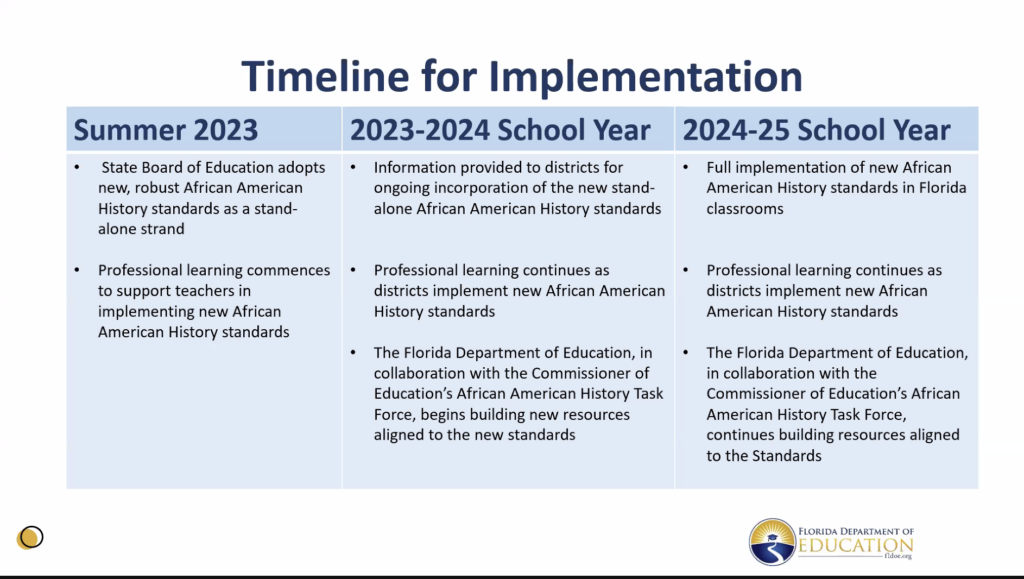Concerns over Florida’s recently adopted African American history standards have been well documented, and the concerns go far beyond the wording of one or two standards.
As we approach the new school year, we have received a lot of questions about the implementation of the standards. Below you’ll find the answers to the most commonly asked questions we have received about how these new standards will be implemented.
Full implementation of the African American History standards is expected to take place in the 2024-25 school year. You’ll notice that in CPALMS, the African American History standards do not yet have any “related courses” assigned to them. Contrast that with the Holocaust standards which quite clearly do have “related courses.”
The standards cannot be fully implemented until the Department of Education engages in rulemaking to correlate the new standards with their appropriate courses. The soonest that will happen is at the October 18 State Board of Education Meeting.
Even after the standards are tied to specific courses there remains the matter of school districts acquiring approved instructional materials that align with the new standards.
Again, the recently adopted Holocaust standards provide a good frame of reference. Even though they were approved by the State Board of Education at their July 2021 meeting, full implementation of them is just starting in the 2023-24 school year.
Below is the timeline the DOE shared on the August 7, 2023, African American History Summer Institute.
This letter was purely political as evidenced by the fact that it was shared on social media in response to Florida’s only Black Republican congressman voicing his concern about students being taught the “personal benefits” acquired by enslaved people.
Even the FLDOE’s Director of Social Studies Education has been clear the standards aren’t ready to be implemented until the 2024-25 school year.
Be sure to speak up at your local school board meetings! Several school board members around the state have already sent public letters to the Department of Education voicing their concern over the standards. If one of your local school board members has done so, be sure to thank them.
If your school board members have not yet taken a position, let them know that you expect them to stand up to the Florida Department of Education and demand that students have the freedom to learn the full, honest history of our state and our nation without any political interference.
Your concern is understandable; in fact, self-censoring is one of the Florida Department of Education’s main goals. The good news for you is that you have the support of your community, your students and the vast majority of parents. The truth is most parents want their children to learn difficult truths and reckon with our nation’s past in order to help create a brighter future for themselves and our country.
As importantly as the support of parents and community members, you have the support of your unions. Your local, state and national unions are prepared to vigorously defend any educator who faces discipline as a result of teaching the truth and ensuring students have the freedom to learn.
Make sure that when you select supplementary materials to use with your students that you follow your school and school district’s policy for approval of supplemental materials. Information that you provide students must be related to your course objectives and selected to encourage student thinking.
A great place to start is with the African American History Instructional Standards Guide that was created by the Commissioner of Education’s African American History Task Force. It is unfortunate that the Department of Education has ignored the recommendations of their own task force, but they are a great place to start.
Additional resources include the US Library of Congress’ resource guide and the Smithsonian National Museum of African American History and Culture’s educator resources.
The standards are found on pages 3-21 here.

